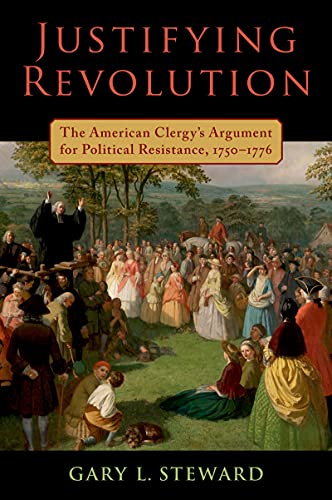An Author Interview from Books At a Glance
Would you like to watch the video interview or listen to the audio? Sign-up today for access to these features and more.
Zaspel:
If Scripture commands us to submit to our governmental authorities, just how did the American clergy of the 18th century justify the war for independence from Britain? Did they abandon their biblical fidelity in favor of political concerns? Did they come up with a new doctrine?
Greetings, I’m Fred Zaspel, and welcome to another Author Interview here at Books At a Glance. Today we’re talking to our friend Dr. Gary Steward about his excellent new book, Justifying Revolution: The Early American Clergy and Political Resistance.
Gary, welcome, and congratulations on an important book!
Steward:
Thank you!
Zaspel:
First, give us a broad sense of the role the clergy played in the American Revolution. How important were they in advancing the patriot cause?
Steward:
The American clergy were incredibly important. They were the moral guides for the colonies, especially in New England. They addressed ethical, political, and social concerns. There were regular election day sermons that the clergy would speak at. The clergy would frequently speak into social and political affairs of the day. Back then the clergy, such as Samuel Davies and George Whitefield, devoted a large amount to the political affairs of the day. Jonathan Edwards also spoke on a lot of political things. They were incredibly involved in thinking about the rise and fall of empires. Some individuals close to the king called the American revolution a Presbyterian rebellion.
Religious issues and perspectives very much played a big role in what was going on in the conflict with England. Some refer to the clergy as the black regimen because of the black Geneva gowns they would wear. As colonists wrestled with moral duty regarding government, the clergy were important guides on moral and ethical issues. Many clergy served as chaplains to the military and as they were leaving the pulpits, they recruited church members with them.
Zaspel:
Give us some names that we might recognize – John Witherspoon was certainly one.
Steward:
John Witherspoon is the big one. He is a signer of the Declaration of Independence and president of the College of New Jersey. Apart from him, there are probably not a lot of names to recognize. Prior to the period, Gilbert Tenant and Elisha Williams at Yale would speak about political issues and even justify arms activity against the French. There were clergy that discussed issues related to moral duty relative to the political powers. Jonathan Mayhew is an especially important figure in terms of his argument for political resistance. He was read and studied by John Adams. Adams credited Mayhew’s sermon on political resistance on shaping his understanding of moral duty to resist.
Zaspel:
You argue that the clergy sensed a “moral duty” to resist. What was their biblical rationale? And what were their arguments from natural law?
Steward:
This is not a new question for the clergyman to address. They are not just inventing and making up their views for the times. Mayhew wrote his piece in 1750 when there were no troubles going on with Great Britain. There were only troubles over the question of resistance related to affairs in England. In a nutshell, regarding the arguments, the clergy believed people had a moral duty to in general submit to their governing authorities.
It is a general and not an absolute duty. At times Christians should obey God rather than man. That might look different in points of time. The general duty that we must submit does not mean at times there are usurpers and illegitimate expressions of authority. Political authorities can be oppressive and in league with the Devil. It is the duty to give a principled, careful resistance. They would draw from political resistance in the Old Testament. For example, Gideon going to war against the Philistines or ungodly rulers in Israel’s history. They drew from those passages that our duty is not absolute. A lot of their sermons are wrestling through Romans 13 or 1 Peter and what the extent of the application is.
There is one major natural law argument that comes in with prominence. That is the argument from self-defense. Some of us just do not know enough about the history to know that the British starting in 1775 began burning old towns to the ground. They did this simply out of revenge. Many of the clergy began arguing for armed resistance starting in 1775 on the grounds of self-defense.
 Zaspel:
Zaspel:
You emphasize that their biblical justification for the revolution was definitely not new to them but inherited. In fact, you say it has even some British precedent. Tell us about all this.
Steward:
There is a long tradition within Protestantism of reformed resistance thought. Some argue that resistance is limited to the lesser magistrates resisting higher magistrates. Others call for more popular resistance. There is a long tradition going back to the 1500s. In the 1600s the Puritans laid the framework for resistance by going to war with Charles the I, he is executed at the hands of the Puritans. In 1689, there is an overthrow of James the II. He was opposed because of his Roman Catholicism. In the 1700s, there are still the defenders of James the II. They argue that he and his heirs are the lawful, rightful kings of England.
They had the precedent when news of the glorious revolution came across the Atlantic, the colonist in New England rose up and overthrew the royal government, Edward Andros. They put him in prison and on a ship back to England. The clergy lead in an orderly revolution. The memories of these heroic godly resistances really set the context for how the British colonists saw themselves acting and responding to what they felt was a new wave of political absolutism. They were following in line with Puritan and 18th century forbearers in offering that resistance.
Zaspel:
Would it be right to say that their biblical reasoning was inherited whole cloth? And in either case, how did they develop it further?
Steward:
It is probably better to see it in continuity with their received tradition. The whole context for the American revolution is godly resistance that had been given. If you are looking for big shifts, for example, anti-monarchical thought or Christian republicanism. You do not really see that at least amongst the clergy. It harkens back to the well-trodden paths of resistance they inherited.
At times those who were in positions of governing authority became oppressive or harmful and the godly are to give principled, disciplined, and thoughtful resistance in protection of life, liberty, and property. The duty to submit is a general duty, not an absolute one. At times wisdom is called for to know how to respond to the times that you are living in.
Zaspel:
How were the American views received – or not! – among Evangelicals back in Britain?
Steward:
The American’s resistance to British policies had lots of support in Britain. Even in parliament, there were politicians who up until the Declaration of Independence were clearly in support of the American’s resistance. Large numbers of the dissenting clergy in England stood with the Americans. George Whitefield, before he died in 1771, was very much concerned about the stamp act. They knew their civil and religious liberties were at stake as well.
Zaspel:
Your thesis runs counter to that of many or perhaps most of today’s interpreters. How do you think the view they represent came about? I suspect some British loyalists would have had their arguments – is this just a continuation of that? Or are there other factors that contribute to it today?
Steward:
The rise of the religious right in the early 1980s gave birth to a reaction. The view was popularized in American circles. The clergy was corrupted by secular enlightenment ideologies. They had an agenda-driven narrative. I try to look narrowly at the question of political resistance. I pulled over 500 sources and try to understand the clergy on their own terms and what was going on in England contemporaneously. We have so many sources that were not available 30 years ago. The kind of work I was able to do is helped by the advancement of sources.
Zaspel:
Without trying to spark a new uprising, are there any political lessons we may learn from the American Revolutionary-era clergy that may be applicable to us today?
Steward:
Not all the clergy had this view. There were loyalists in the mix. Most Congregationalists and Baptists were on the side of the American revolution. It was maybe half of the clergyman. Godly people took different views. These issues are complicated and sometimes difficult in thinking about how we should respond to our government. We can learn that there should be a careful and thoughtful evaluation of how to respond to the government’s demands of us. This has not been a question we have had to think through for a long time. Christians around the world deal with oppressive governments. A lot of us went into 2020 unaware of how theological leaders need to wrestle through obligations to our governing authorities.
Zaspel:
Give us a brief overview of your book so our listeners can know what to expect.
Steward:
I start out the book by looking at the state of the question before the American revolution. I go all the way back to the reformation and then I pick up the story with Jonathan Mayhew in 1750. This sets the theological context of how Protestants wrestled with this question of resistance. I move to the Stamp Act period, the beginning of the troubles. I explore the context and colonial background. I go through the threats they felt for their religious liberty. They feared losing civil and religious liberty. These were both at stake in their minds as they moved towards greater degrees of resistance. I go over the argument for self-defense in the 1770s and the historical events surrounding the emergence of this argument from self-defense. There is a whole chapter on the British clergy and how they thought and wrote about this. The final chapter looks at John Witherspoon. He was a key figure and his political resistance helps us know how we can think about these issues.
Zaspel:
We are talking to Dr. Gary Steward about his important new book, Justifying Revolution: The Early American Clergy and Political Resistance. For us American patriots in particular it’s a fascinating read – an important contribution to the study.
Gary, thanks for your good work, and thanks for talking to us today.
Steward:
Thank you, Fred.

